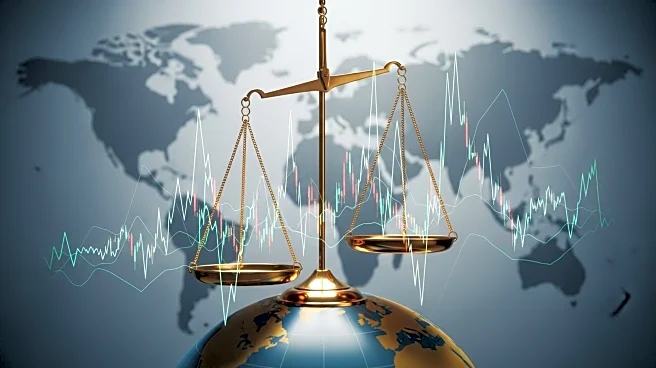What is the story about?
What's Happening?
Commodity markets are experiencing significant fluctuations due to a combination of geopolitical tensions, weather events, and policy changes. Oil prices have surged past $70 a barrel following Ukraine's drone strikes on Russian fuel exports and Russia's partial diesel export ban. Precious metals like gold and silver have reached record highs, driven by safe-haven demand and expectations of further Federal Reserve rate cuts. Meanwhile, disruptions at Indonesia's Grasberg mine have shifted the copper market from surplus to deficit, prompting price target hikes. Grain markets are also affected, with U.S. soybeans facing pressure from China's preference for Argentine crops during a tax holiday.
Why It's Important?
These developments underscore the interconnectedness of global markets and the impact of geopolitical events on commodity prices. The rise in oil and precious metal prices reflects investor concerns about supply disruptions and economic uncertainty. The copper market's shift to deficit highlights the vulnerability of supply chains to unexpected disruptions. For U.S. agriculture, the trade dynamics with China emphasize the ongoing challenges posed by international trade policies. These fluctuations can affect various stakeholders, including investors, producers, and consumers, as they navigate the complexities of global commodity markets.
What's Next?
The commodity markets are likely to remain volatile as geopolitical tensions persist and policy decisions unfold. Traders and investors will closely monitor developments in Ukraine and Russia, as well as Federal Reserve actions regarding interest rates. The agricultural sector will watch for changes in trade policies and weather conditions that could impact crop yields. Additionally, the energy transition and demand for green metals may continue to influence base metal markets. Stakeholders will need to adapt to these dynamic conditions, potentially leading to strategic shifts in investment and production strategies.
Beyond the Headlines
The current commodity market volatility raises questions about the long-term sustainability of supply chains and the role of policy in shaping market dynamics. Ethical considerations regarding resource extraction and environmental impact may gain prominence as stakeholders seek to balance economic growth with sustainability. The geopolitical landscape could also drive shifts in energy policy, influencing the future of renewable energy and fossil fuel reliance. These broader implications highlight the need for comprehensive strategies to address the challenges and opportunities presented by global commodity markets.
















